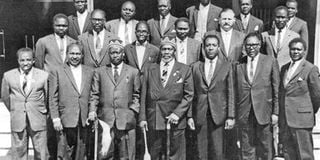Why the unfulfilled 1963 promises have kept Kenyans in poverty cycle

Members of Kenya's first Cabinet. PHOTO | FILE | NATION MEDIA GROUP
What you need to know:
- Various authors demonstrate the close nexus between governance, human rights, sustainable livelihood, peace and prosperity.
- Exercising or enjoying those rights, however, is directly linked to knowledge.
- The discussions are anchored on the 2010 Constitution that provides an elaborate and expansive exposition of rights.
At independence in 1963, the government committed to ending three things — poverty, disease and ignorance. To actualise that dream, the government published the watershed policy in 1965, Sessional Paper No 10 on African Socialism and its Application Planning in Kenya, with five key objectives: political equality; social justice; human dignity including freedom of conscience; freedom from want, disease and exploitation; equal opportunities; and high and growing economies. Many other policy blueprints have been developed since.
However, more than five decades later, poverty, ignorance and illiteracy persist. Many other challenges have piled up — corruption, nepotism, social and regional inequalities, gender disparities, poor governance, dictatorship and mismanagement. Successive governments have failed to tackle these despite lofty promises in policy articulations.
The clamour for constitutional change during the 1980s to the 2000s was geared towards changing the architecture of governance and recreating socio-economic and political structures with the goal of achieving equity and fairness. Thus, when the country enacted a new Constitution in 2010, there was a feeling of high achievement. That the country had put itself on a new pedestal and attained momentum for growth and advancement.
Against this backdrop, the book under review, Knowledge for Wealth Creation, provides a sobering assessment of the state of our nation. Where are we after ratifying the 2010 Constitution with a robust bill of rights and civil liberties?
The point of departure is that knowledge is the sine qua non for creating wealth. Knowledge equips citizens with the power to exploit their environment for sustainable livelihood; access political and social rights; participate in governance and determine their own destiny.
The book is a compilation of papers and is divided into nine chapters. Throughout the pages, the various authors, who are academics and researchers, demonstrate the close nexus between governance, human rights, sustainable livelihood, peace and prosperity. Exercising or enjoying those rights, however, is directly linked to knowledge. The discussions are anchored on the 2010 Constitution that provides an elaborate and expansive exposition of rights.
Right at the beginning, Judith Bahemuka and Hilda Simiyu posit that the success of any society rests on investment in knowledge. “For societies to remain competitive and productive amidst dynamics of globalisation and the ever-changing technology, investment in knowledge and human capital is vital. It is through knowledge that societies can predict the future and put in place mechanisms that steer the globe to the desired future.”
Thus, the thrust of the book is to examine how Kenya can tap into its inherent knowledge to improve the well-being of citizens. Conversely, it is argued that equipping citizens with knowledge empowers them to make correct decisions and engage in productive ventures to lift them out of poverty and expand their incomes.
At the centre of the discourse is human rights. One of the authors, Prof Winnie Mitullah, frames the debate by explaining the interconnectedness between human rights, governance and sustainable livelihood. Embedded in sustainable livelihoods are social, economic and political rights. Questions of resource exploitation and distribution and accountability are pivotal here. Given that these are provided for in the Constitution, the author argues that citizens require proper sensitisation and knowledge of the relevant provisions and, above all, ways and means through which they can make demands on those.
Some of the critical issues discussed are food security, access to water and delivery of social welfare services. Agriculture is the mainstay of the country’s economy. The 2010 Constitution puts guarantees on food security, which underpins commitment to agricultural productivity. Agriculture is a devolved function giving counties responsibilities over its management.
A chapter on food security, written by researchers, among them Prof Shellemiah Keya and Dr Willis Kosura, illuminates the country’s potential for food sufficiency. Based on a study on four counties — Homa Bay, Kwale, Makueni and Nairobi — the authors note that agricultural productivity in those localities is currently below 50 per cent because of poor practices. Conversely, they argue that through new knowledge that prioritises technology, proper land use and conducive policies, the counties can double food outputs. And that applies for all the other counties. In essence, the country can pull itself out of food scarcity to abundance through deployment of new knowledge in agricultural practice.
Devolution, which is at the nerve centre of the Constitution, is elaborately discussed in a chapter by Prof Peter Wanyande, who was a member of the Commission of the Implementation of the Constitution (CIC). Germane to the discussion is the rationale for devolution, the ideological and political contestations, challenges and opportunities. Notwithstanding challenges that include legal loopholes, institutional failures, corruption, ethnic conflicts and financial shortfalls, the overriding treatise is that devolution offers the best choice for the country as it promises equitable resource allocation and giving citizens opportunities to make decisions on their destiny.
Other issues discussed are the role of non-governmental organisations in community capacity building and social development; devolution pathway to equitable regional development as well as design and delivery of social welfare services,
At this point in time of hotly contested political debates that are devoid of facts and context, scholars have a duty to provide insights through research to inform public discourse. The book under review therefore comes in handy to fill a gap in national conversation.




